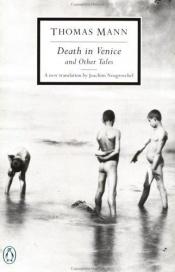Døden i Venedig og andre noveller
Blurb
"Death in Venice," tells about a ruinous quest for love and beauty amid degenerating splendor. Gustav von Aschenbach, a successful but lonely author, travels to the Queen of the Adriatic in search of an elusive spiritual fulfillment that turns into his erotic doom. Spellbound by a beautiful Polish boy, he finds himself fettered to this hypnotic city of sun-drenched sensuality and eerie physical decay as it gradually succumbs to a secret epidemic. In his novella "Tonio Kroger," Mann poetically traces a young writer's struggle between bourgeois strictures and artistic genius. Skillful dialogue and language reflect the title character's emotional conflicts, especially in his wistful visit to his home town and his sentimental journey to the Baltic. "Gladius Dei," in contrast, is a sardonic depiction of a self-styled warrior of God, who battles against the sexual openness and profanity of Munich, the art center of northern Europe. In "The Blood of the Walsungs," set in turn-of-the-century Berlin, a wealthy Jewish family, modeled after the family of Thomas Mann's wife, is excoriated in a Wagnerian evening that ends in self-loathing and self-loving incest.The seven stories in this collection represent the early part of Mann's literary career, beginning with work he produced in 1896 at the age of 21, and culminating in his celebrated novella, "Death in Venice" in 1912. A magnificent tale of art and self-destruction.

 English
English Español
Español Deutsch
Deutsch










Member Reviews Write your own review
Be the first person to review
Log in to comment